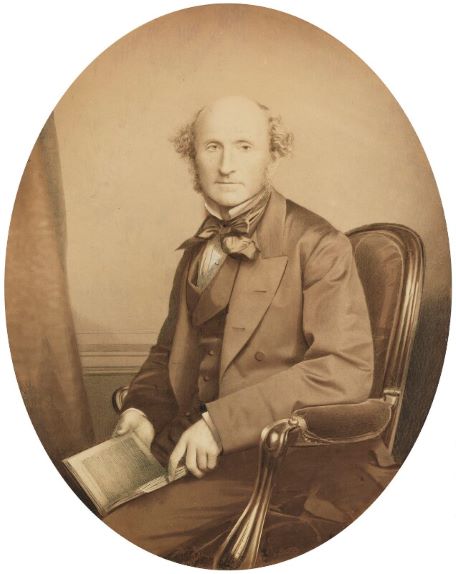Liberty Matters
Regarding Keynes

In the lecture The End of Laissez Faire (1926),[68] Keynes acknowledged not only the major philosophical shortcoming of utilitarianism but also that there could never be a satisfactory utilitarian response to the Rousseauian critique: “private and social interest do not coincide”.[69] Even more important, in The General Theory of Employment, Interest and Money (1936), Keynes changed the focus of economics largely because of an “arbitrary and inequitable distribution of wealth and income.” The focus is now on short-run employment creation rather than long-run wealth creation as the central aim of economic policy. The causes of economic growth are at best an afterthought.
Keynes argued that it was aggregate demand which determined economic activity. Inadequate aggregate demand leads to high unemployment. In order to moderate the “boom and bust” cycles of economic activity, and to achieve full employment, government regulation of the demand side of the economy was needed. For the market to reach its full potential (telos equilibrium), we need full employment. Because of price stickiness (workers often refuse to lower their wage demands), government needed to adjust aggregate demand and aggregate supply. One way in which government could stimulate demand in times of high unemployment was by spending on public works. Public works were not a form of redistribution; they were intrinsically valuable, indirect means to the creation of wealth, and a temporary measure for exceptional circumstances like the Great Depression. He did not advocate government spending financed by borrowing but insisted upon balanced budgets.
Keynes also had his version of “perpetual peace.” If market economies can be managed successfully on the domestic level, then the same could be true internationally (e.g, a coordinated international monetary system). He advocated and worked tirelessly in the postwar period for a global market economy rather than the prevailing mercantilism. As Galbraith was later to comment (2002): “During the decades that happen to coincide with the rise of neoliberal ideology, with the breakdown of national sovereignties, and with the end of Keynesian policies in the global debt crisis of the early 1980s, inequality rose worldwide.”[70]
Was Keynes a supporter of Lockean liberty or a Rousseauian egalitarian? In his own mind he was undoubtedly a Lockean. He was firmly committed to the Technological Project; he thought he was repairing the market economy based on his understanding of the relationship between demand and supply; he believed in limited government (opposing social democracy in favor of management by an intellectually and morally qualified elite); and he advocated world peace. The role of the state is not ownership of the means of production but management of investment (not production but distribution with the expectation that this would lead to full production); he supported the rule of law; and he most certainly presumed the sanctity of individual autonomy. To the extent that he acknowledged the social problem, his response was no different in kind from that of Smith or perhaps Mill – amelioration and evolution not revolution.
The success of the Technological Project had also encouraged the Enlightenment Project view that there could be a social technology. The latter was premised on the view that every effect had a cause, and therefore all human action is caused, including what we “mistakenly” think are free choices of the will. This was a problem with which Mill wrestled throughout his lifetime, but he came down on the side of believing in free will. Individuals were ultimately responsible for the choices they made.
Nevertheless, there was a gradual transition from the early 19th-century view that poverty was a moral problem involving individual responsibility (Mill and Charles Booth) to the 20th-century view, via the Fabians, that the poverty problem is really a social problem about the equality of the working class. Whereas early 19th-century Protestants had emphasized the difference between the “deserving” poor and the “undeserving” poor, in a post-Fabian world of neoclassical economics the poor were victims requiring social policies of reform. When one adds to this the traditional Christian commitment to solicitude for the poor, one can see the irresistible attraction to Christian utilitarianism. This greatly weakens faith in and commitment to individual freedom in the social, political, and economic realms.
Keynes and his immediate predecessors (as well as his successors) were unwilling to give full allegiance to individual autonomy. And in a world in which professionals prided themselves on being “scientific” and wanted economics to be a science, it was easier to acquiesce in a covert acceptance of determinism and not worry about the philosophical conundrums. Hayek, on the other hand, did not shy away from the equally difficult task of defending the freedom of the will in his philosophical works. Nevertheless, in his economic works, Hayek was content to focus on the incoherence and danger of social planning. Of course, Hayek will demolish Keynes. But it is important to identify the origins of the problem, and those origins do not include Mill.
Endnotes
[68.] John Maynard Keynes, The end of laissez-faire (Hogarth Press, 1926). This essay was based on the Sidney Ball Lecture given by Keynes at Oxford in November 1924 and on a lecture given by him at the University of Berlin in June, 1926. Online <http://www.panarchy.org/keynes/laissezfaire.1926.html>. Also see, The Collected Writings of John Maynard Keynes. Volume 9, Essays in Persuasion (Royal Economic Society, 1978), pp. 272-294.
[69.] See also, John Maynard Keynes, "Am I a Liberal?" (1925) in The Collected Writings of John Maynard Keynes. Volume 9, Essays in Persuasion, pp. 295-306.
[70.] James K. Galbraith, "A perfect crime: Inequality in the age of globalization," Daedalus, 131 (1) (Winter 2002).
Copyright and Fair Use Statement
“Liberty Matters” is the copyright of Liberty Fund, Inc. This material is put on line to further the educational goals of Liberty Fund, Inc. These essays and responses may be quoted and otherwise used under “fair use” provisions for educational and academic purposes. To reprint these essays in course booklets requires the prior permission of Liberty Fund, Inc. Please contact oll@libertyfund.org if you have any questions.